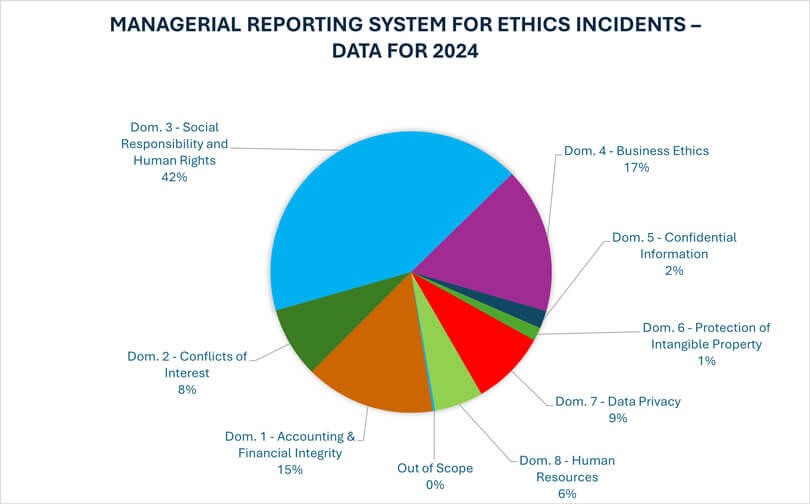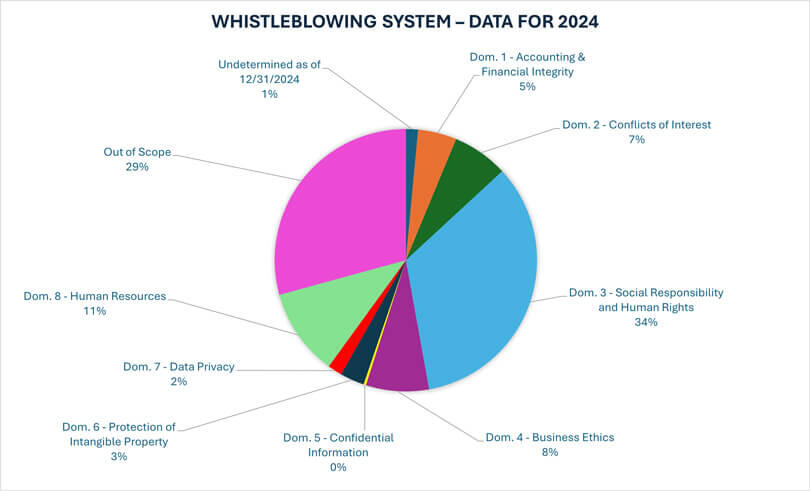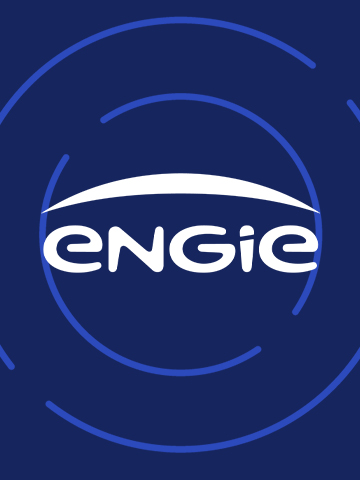Laws and regulations apply to all (ENGIE Ethics code of conduct, p.8) and the ethical compliance system outlines how the Group is organized to help implement all of the Group’s ethics procedures and tools for monitoring compliance.
Ethical compliance system notably include:
The managerial reporting system for ethics incidents My Ethics Incident
The compliance process includes an obligation for GBUs, entities, businesses and functional lines to report any suspected ethics incidents as soon as they come to their knowledge. To do this, My Ethics Incident is the Group managerial tool for reporting ethics incidents. It allows the reporting and handling of ethics incidents in the following areas: business ethics, accounting and financial integrity, conflict of interests, social responsibility and human rights, confidential information, the protection of intangible assets, data privacy and human resources.
The My Ethics Incident process requires a notification obligation that applies to all these types of ethics incidents, whether they are allegations or proven incidents, and regardless of the monetary value concerned. Each reported matter is reviewed and/or investigated. ENGIE is committed to the diligent, independent and objective conduct of its internal inquiries and investigations in accordance with the provisions of the Group internal enquiry guide. Every substantiated matter is sanctioned. For every substantiated matter it is assessed which measures are required to prevent repetition in the future accompanied by, if needed, corrective measures.
In 2024, ethics incidents gave rise to 171 sanctions out of which 34% led to contractual relation termination with ENGIE’s collaborators and 40% resulted in other disciplinary sanctions as for instance temporary suspension and salary deductions. There have been 5 unilateral commercial contract terminations (with external providers for instance) in relation to ethics incidents.
The total number of alleged or proven ethics incidents reported via My Ethics Incident in 2024 was 394 (222 in 2023). Social responsibility and human rights matters were the most represented.

N.B. : No insider trading (market abuse regulation) allegations in 2024
The My Ethics Incident tool makes it possible to track the treatment of each incident until it is closed. Thorough knowledge of ethical incidents and their treatment helps to prevent ethics risks and implement corrective measures. The ENGIE compliance committee evaluates the treatment of ethics incidents and monitors the process for updating the Group’s Ethics & Compliance program.
This topic is reported to ENGIE Board of Directors’ Ethics, Environment and Sustainable Development Committee (EESDC).
Whistleblowing system
ENGIE also put in place a whistleblowing system in accordance with the Sapin 2 law and duty on vigilance law through which 335 alerts have been escalated in 2024 (274 in 2023), 34% of which concerned the social responsibility and human rights domain.

N.B. : No insider trading (market abuse regulation) allegations in 2024
Mandatory ethics trainings
More information about ethics trainings can be found here.
Annual ethics compliance procedure
The compliance procedure allows to ensure that all legal and regulatory requirements, as well as all voluntary commitments taken by the Group, GBUs and entities regarding ethics and compliance are respected.
All of the Group’s ethics and compliance officers must produce an annual report of progress made by their entity in terms of its ethics and compliance organization in application of ENGIE’s rules and procedures, as well as any possible provisions made or specific actions taken by the entity itself. The report is accompanied by a compliance letter from the entity director certifying its responsibility and commitment to applying the ethics program throughout the organization under his/her responsibility. The report is submitted to the upper level entity.
The Group compliance report is presented to the ENGIE Board of Directors’ Ethics, Environment and Sustainable Development Committee (EESDC).
Guidelines for managing early warning signs in the field of ethics and compliance
The Guidelines for managing early warning signs for the management of weak signals in the field of ethics and compliance formalize ENGIE's commitment to prevent and detect ethical incidents as early as possible through early warning signs known as "weak signals". They include specific examples of weak signals in the field of ethics and compliance and identify the actors involved in their implementation.
Policy for incorporating ethics into HR processes
This policy details the Group's ethics requirements for integrating the ethics and compliance dimension into all Human Resources processes. It applies to all Group employees, the Group entities (GBU, Regional Hub, subsidiaries, functional lines, and other managerial entities) ensuring its implementation. It covers the following areas: recruiting, welcoming, sensitive positions regarding ethics and compliance, training, annual appraisal, end of employment contract, whistleblowing and sanctions/disciplinary measures.
In addition to the disciplinary measures applicable to ethical and compliance breaches, the Group applies a Malus to the variable compensation of its senior executives in order to sanction a managerial or governance failure in the event of a violation of the Group's ethics and compliance principles within their managerial scope.
Competition rules
ENGIE attaches the utmost importance to complying with rules of competition, and refuses any practice that violates these rules. Its employees are encouraged to behave irreproachably towards their competitors, customers, suppliers, subcontractors and prospects. Prohibited behavior includes: unlawful agreement, abuse of dominant position, and discriminatory, excessive or predatory prices.
ENGIE prohibits all disloyal practices, for example collusion with competitors, which have the aim of:
- Bid rigging
- Fixing a purchase or sales price
- Exchanging of insider information
- Limiting production, investments, innovation and their use
- Sharing or segmenting markets, outlets or supply sources, be this by territory, customer type or any other criteria
- Eliminating a competitor, customer, supplier, or newcomer on the market
- The Group also has an internal expertise center in competition law, which has a competence in principle (mandatory referral) enabling it to deal in a consistent manner and in the best interests of the Group with all competition law issues.
EMBARGO Policy and export control
"The group's embargo policy covers all international sanctions and associated export control issues.
To help employees understand the policy, it is organised by country and by colour code: black for prohibitions, red for mandatory opinions from the DECP, and orange for a mandatory opinion from a legal expert.
It is based on a Digital tool in which the files are recorded and monitored."

